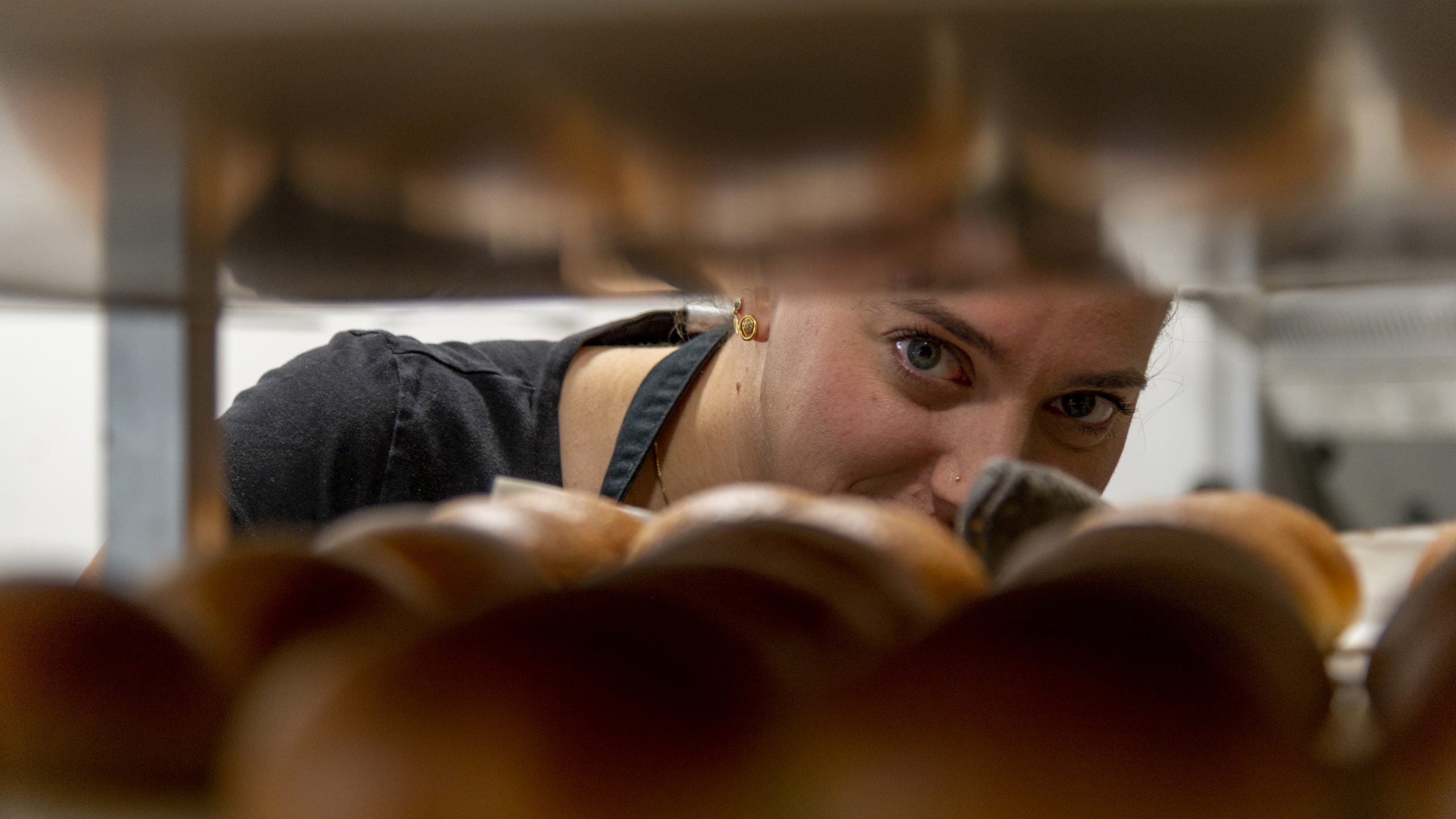Adina
“Bread is a common language because we all eat it.”

Adina is a baker. She is 28 years old and works in a small boutique bakery in Modi’in, just outside Jerusalem. After her parents emigrated from Australia, Adina was born and raised in Israel. She spent most of her life in and around Jerusalem and can’t see herself living anywhere else. Some of her bread is even inspired by Jerusalem and the Old City. Regarding immigration, Adina thinks that prior to taking in refugees, every society needs to ask itself if it will do more harm than good to the society.
How does immigration affect you?
I was born in Israel, but both my parents emigrated from Australia. They met and got married here in Israel, and in fact my brothers and I grew up here. At home we spoke both English and Hebrew. But when my siblings and I talk, we speak in Hebrew. My whole family is abroad, and there are always some cultural misunderstandings. This happened more often when I was a girl and my English wasn’t as good as it is today. So there have been many cultural gaps.
For example, after my parents, who do not look Israeli, came to school to meet with my teachers, my friends ridiculed me, saying that they are Ashkenazi [European Jews] and used stereotypes, saying things like “your food must be awful at home”.
It seems like such gaps have narrowed over the years and with the development of Israel. But I think that especially as a girl it was very difficult when no one could help with my homework in Hebrew, for instance, because it is not my parents’ first language. That’s where immigration affected me in my personal life.
And how about the effect of immigration on Israel?
In general, Israel is a country of immigrants: either immigrants that are coming for Zionism and religion [i.e., Jews] or immigrants that are refugees who are fleeing war in their own countries and find safe haven in Israel. I personally don’t agree with the way Israel deals with refugees.
I understand that it’s very hard and painful to close the doors on people who are seeking refuge because they don’t have a home. But I think that this population can be a burden on Israel’s progress and prosperity. If someone has the right or, God forbid, the genuine need to live in Israel then fine, we will not shut them out, we will take them in and make every effort to integrate them into Israeli society. But in the end, it is a population that sees itself as only temporarily here, because they are refugees and ultimately they are supposed to return to their home country. This is a population that does not contribute much to the community, they live and survive. It’s a population that comes from third world countries, and the cultural gaps are so astronomical that they are impossible to bridge.
It just never ends, and I think the impact of it here in the country is very severe. It ranges from people who are afraid to walk on the street in a certain area because it is an area with many immigrants or people that are afraid that they might be harmed physically, or women who are afraid to walk alone because they might be harassed. Obviously, this harassment could have happened regardless of refugees and migrants because it is a problem that exists everywhere in the world without any connection to immigration, but at the end of the day it is a population that brings with it more harm than good. And so we need to ask ourselves if we have a place for them or not.
“Bread is not a matter of class. Every class in the population eats bread, and through bread one can get to know people and get to know cultures and styles.”
Do you think immigration contributes to the country?
In general, it depends on who the immigrant is and what he can contribute. In Israel, which absorbs immigrants, we have people coming from Ethiopia and the big emigrations from Russia in the 90s; these were immigrants who did not necessarily come with many skills and abilities, and so their contribution is smaller. Immigrants who come from Europe with academic degrees obviously make a different contribution. But every country in the world that opens its gates to immigrants should be open to diversity. Whether in cultures, in foods, in the character that the people will bring with them, and the country has to be prepared and ready for all this. An immigrant can contribute because he can expose others to additional types of cultures and populations, and I am always in favor of being exposed and getting to know more and more and not just remain in the bubble of our lives.
This is especially true if more professionals come here or musicians, singers and actors who can always contribute. But it can equally be harmful. If, for instance, these people come from poor countries and war zones there is a greater chance that they will cause more harm than good, and each country has to make its own assessments whether it is right to absorb these people or not.
You’re a baker, what can you say about food and immigration?
My profession is a baker and pastry chef, and I have been in this field for several years now. For the past two years I have been focusing on bread. It is the basis for everything. Each country has its own kind, and bread — like water — is life itself. Bread is not a matter of class. Every class in the population eats it, and through bread one can get to know people and get to know cultures and styles. Once you see bread baked in a certain way or having a certain color or in a certain combination of flavors or made in certain techniques you can know what the origin of the bread is or what inspired the baker, and that is just amazing.
This coming September, I hope — if the Coronavirus does not ruin the plans again — I will be flying to an international competition in the world of bread. Two of my four types of bread are inspired by Jerusalem and the Old City because that’s my source, that’s what I love and that’s my foundation. So everyone who will taste my bread will be able to speculate or imagine where this bread came from and what message it came to convey. And simply bread is a common language because we all eat it. Any meal can focus on it.
